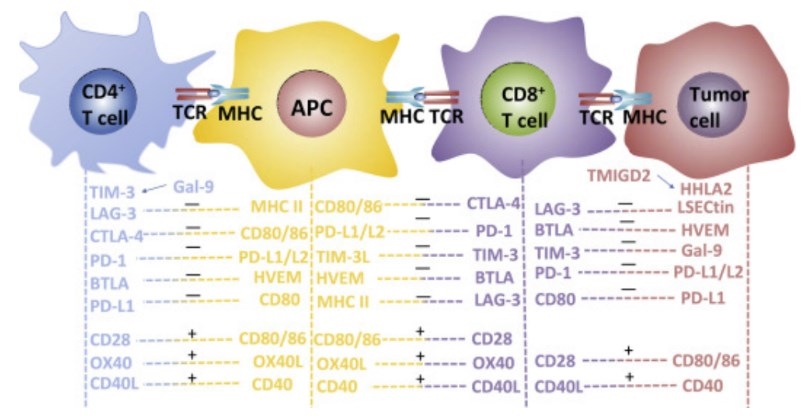Supported by in-house scientists and first-in-class technological platform, Creative Biolabs is confident in providing Binding & Interaction Assay Service for Immune Checkpoint to facilitate your project success.
Immune checkpoints as a class of key regulatory molecules of the immune system, T cells recognize host cells to maintain homeostasis and prevent autoimmunity by these molecules. In cancer, tumor cells use this molecular mechanism of immunosuppression to resist the anti-tumor response and escape cellular surveillance system.
One approach to avoid this immunosuppression is to selectively suppress/block the interactions of immune checkpoints, which can restore and promote T-cell survival and proliferation. Therefore, it is crucial to study the interaction between immune checkpoints.

Immune checkpoints include two types, co-stimulatory immune checkpoints and co-inhibitory immune checkpoints. For instance, the tumor necrosis factor (TNF) receptor superfamily: CD27, CD40, OX40, GITR, CD137, and B7-CD28 superfamily: CD28 itself and ICOS are the common stimulatory checkpoint molecules. Inhibitory checkpoint molecules include programmed cell death-1 (PD-1), programmed cell death ligand-1 (PD-L1), cytotoxic T lymphocyte antigen-4 (CTLA-4), human endogenous retrovirus-H Long terminal repeat-associating 2 (HHLA2), B7 homolog 4 protein (B7-H4), T cell membrane protein-3 (TIM-3) and Lymphocyte-activation gene 3 (LAG-3), which are up-regulated during tumorigenesis.
Based on our multiplexable, highly sensitive, and specific platform, we are capable of providing multiple relevant assay endpoints to study the interaction between immune checkpoints, along with its potential mechanism of action (MOA). The services we can provide including but not limited to:
In order to verify the binding affinity and specificity of large or small molecules to immune checkpoints, Creative Biolabs is dedicated to providing ligand binding assays based on several methods, such as biolayer interferometry-based (BLI) binding assay, surface plasmon resonance (SPR) assay, and microscale thermophoresis (MST) binding assay.
With our state-of-the-art technologies and profound knowledge in immune-oncology areas, Creative Biolabs has developed several cell-based binding assays. Meanwhile, we can also customize the experiments according to your specific requirements
Cell-based blocking assays are very biologically related and sensitive, which can be used for evaluating the interaction and effect of various immune checkpoints. Creative Biolabs has developed the specific cell-based blocking assay to identify drug candidates that specifically block the interaction between immune checkpoints.
Reporter assays offer an approach to easily measure biological responses. Luciferase assay is a widely used method that is highly quantitative, sensitive across a broad dynamic range, and easily detected by measuring light output. By means of many available reporter genes such as alkaline phosphatase, β-galactosidase, fluorescent proteins, and luciferases, we have developed novel reporter assays to better study the interaction of immune checkpoints.
Creative Biolabs is confident in providing immune checkpoint Binding & Interaction Assay Service of high quality to meet clients’ demands. As well, Creative Biolabs would like to provide many other immune-oncology services. If there is any query, please contact us for more details.
For Research Use Only | Not For Clinical Use